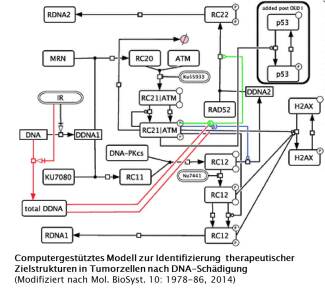Dynamic Systems
Definition
Our life is in several ways being determined by complex dynamic systems. The term dynamic systems means well-defined, time-dependent functional units, that interact with their environment via their signal in- and outputs. The weather, the financial markets, industrial plants, our environment and its ecological systems and, of course, the human body with its organs and uncountable cells are complex dynamic systems.
Description and Analysis of Dynamic Systems

They all have one thing in common: by an interaction of a variety of influencing factors and their mutual interferences a "complex dynamic" develops. That complexity often leads to an astonishing behaviour, which can not be foreseen by pure intuition. Therefore, mathematical models and methodsfor the calculation, analysis and influence of that behaviour, are necessary. Those methodical approaches correspond to experimental works in order to better understand, for example, how a system will react on a particular external stimulation. Even very small changes to the system can thereby take dramatic, good or bad, effects, which only can be calculated in advance under consideration of the exact interferences within the system. In this context, the cooperation of experimentally and theoretically working researchers is an essential condition for success - that applies to both technical and biologic-medical systems. So the demand for a cost-efficient, environmentally-friendly and sustainable production technology is as well as the demand for an effective, smooth and payable medical therapy of big significance. In this sense, fundamental and applied research are closely related.
The Research Center Dynamic Systems: Systems Engineering
The Research Center Dynamic Systems conveys this important multidisciplinary research and development work. The exploration of dynamic systems not only serves scientific interests, but beyond that interests of the society.

